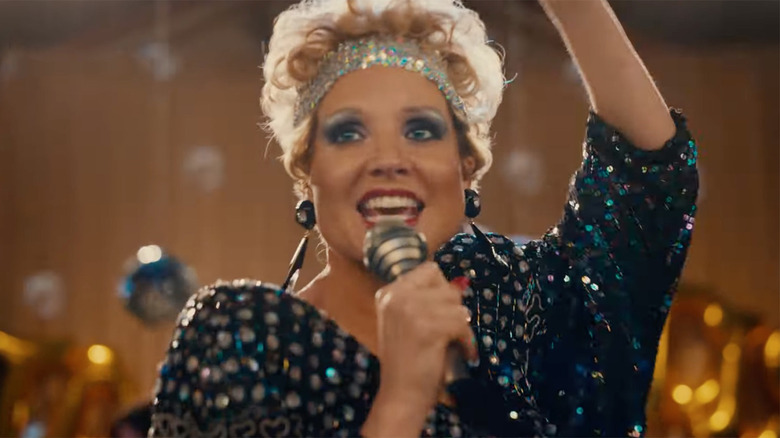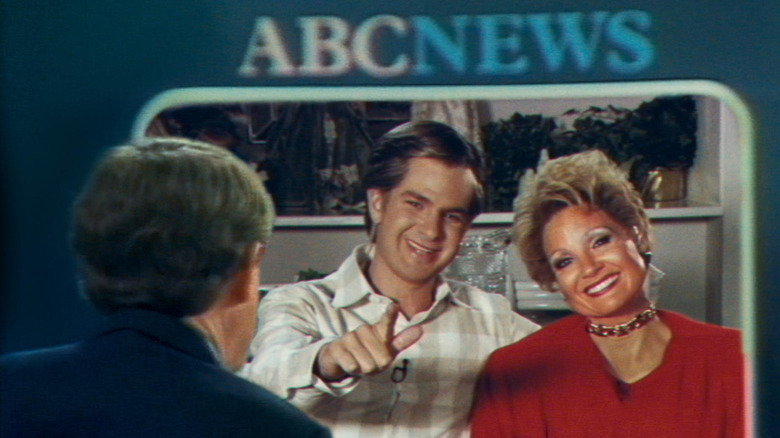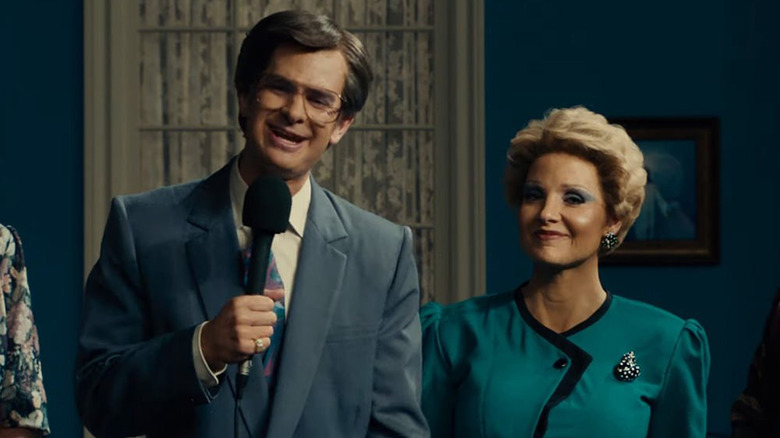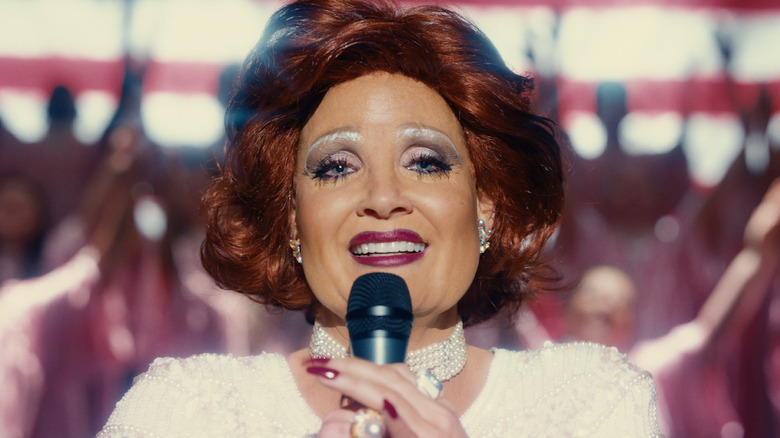The Eyes Of Tammy Faye Director Michael Showalter On Making A 'Religious Boogie Nights' [Interview]
"The Eyes of Tammy Faye" arrives in theaters this weekend to tell the story of pioneering televangelists Jim and Tammy Faye Bakker, played by Andrew Garfield and Jessica Chastain. The couple shared a meteoric rise to fame and fortune, but it all came crumbling down when they became embroiled in romantic and financial scandals that broke the purity and sanctity of their religious brand.
We spoke with director Michael Showalter about the film, which tells the dramatic tale with a little bit of satire but without actually mocking the Bakkers or their beliefs. Find out how Showalter gave the film a natural sense of humor, the filmmakers that influenced the movie's style the most, and the direct connections to the rise of the religious right and conservative media.
"I would say that a religious "Boogie Nights" is a really good analogy."
This is a fantastic movie, and clearly one of your more serious efforts. I know that with movies like "The Big Sick" and "Hello, My Name is Doris," you've certainly tackled dramatic material, but there's still a strong comedic element in them. Even though there's a sense of humor throughout this movie, this definitely feels like the most dramatic project you've tackled yet. Is that kind of a conscious decision as a director you've made? Because I've noticed that the films you direct tend to lean more into dramatic territory than the movies that you've written.
Not a conscious decision. It just kind of happened that way. There are stories that I gravitate towards the story and want to tell the story. In this case, it just happened to be more dramatic than some of the other stuff I've done. But in a weird way, they're all sort of the same to me. I treat the drama and the comedy kind of the same way. So it didn't feel that dissimilar internally, even though I know that this movie is way more dramatic than the other movies, if that makes any sense. I felt like the characters and the world were — there was a kind of absurdness to it and over the top-ness to it, that I felt like fit into the kinds of stories and characters that I find really interesting. Even though the execution in this case was potentially less straightforwardly comedic than in other cases.
That actually brings me to my next question. How do you bring a sense of humor to a story like this that is meant to be dramatic where it doesn't feel like you're intentionally mocking the characters?
That's a good question. Again, in general, I'm not ever trying to make fun of anybody. Even in the comedies, more comedic stuff, I'm not ever really wanting to make fun of somebody. It's more of a situation where, inherently, there's something funny about it. It could even be just the weird ways in which life is funny. Just life is funny.
There's a scene in the movie where Tammy's putting on lotion in bed. There is something funny about it, just because it's just kind of funny that we squirt this stuff on our hands and rub it on our body. There's just something kind of observationally funny about it. Another scene that I always liked is where Andrew Garfield is talking to Tammy through a big glass window in the recording studio and his voice is all muffled. And that's funny to me. It's funny how, when you talk to somebody through a glass window, their voice is muffled.
The humor is in the really tiny details that aren't about making fun of anybody, but more of just observing reality as it was. The scene that always makes me laugh the most in the whole movie is when Colonel Sanders is on "The 700 Club." Jim [Bakker is] talking about how the audience can probably smell the fried chicken from here. Kind of like, "They're excited because they can smell your fried chicken," you know? That is just verbatim what was on the show. That's exactly what was said when Colonel Sanders was on "The 700 Club." Those are the exact lines that were said.
That was the most entertaining things about this movie. If you didn't know the Bakkers were real, you would't believe these people weren't just characters. But there's so much real footage that shows this is exactly how they were. At times it feels like the story unfolds in almost a heightened reality because of that. I think even the visual style goes hand-in-hand with that work. Can you talk about some of the cinematic influence you had that maybe inspired the visual style and the production design and whatnot?
A big one for me is Todd Haynes. Todd Haynes does sort of contemporary melodrama. A lot of his films I would call sort of modern melodramas. I thought of those films or some of P.T. Anderson's films. Melodrama has a kind of weird connotation now, but in melodrama I mean that in the sense of a genre of filmmaking, that is a beloved genre of filmmaking and can be in its best form, great art. So I thought about probably those filmmakers more than any others, but there's all sorts of other influences as well from, gosh, I'm blanking on his name, but "Nashville." The director that did "Nashville" [Editor's Note: It's Robert Altman]. In terms of trying to create a sense of a world, a three-dimensional world, where you really feel like you're there and there's just this enormous amount of stimulus coming at the audience.
I'm glad you mentioned P.T. Anderson because I was feeling a little bit crazy about this perspective, but there's a religious "Boogie Nights" kind of vibe from this movie. Sometimes it's even like a Mr. Rogers meets "Wolf of Wall Street" kind of thing too.
[laughs] Yeah. Those are really good analogies. I would say that a religious "Boogie Nights" is a really good analogy.
Especially with the sexual humor, and there's so much sexual tension on top of that.
Yeah.
"That's been a slow process, but it's not like a vague connection. It's a direct connection."
Were there any worries on your behalf, as a filmmaker, about having Tammy Faye's children involved in the making of the movie? I imagine it can be kind of hard to make a movie about real people when you have their family involved. So was there any concern as far as your depiction of Tammy Faye's life or the transgressions of their father?
Only in that obviously it's important that we feel like we're telling the right story, not wanting to candy coat it, either. Not wanting to do a puff piece but also not wanting to fall into the same trap that kind of got us here in the first place. Being overly sensational about what did or didn't happen. I personally was not directly involved with either of them as much as Jessica [Chastain] was. I tried to keep myself separate a little bit from that so that I could remain impartial to an extent.
Yeah, absolutely. What's one of the more fascinating things that you learned about Tammy Faye or even Jim Bakker during the making of this movie that a lot of people maybe didn't know, even after they were so highly publicized and reported on during the height of their fame.
One of the things that Jessica Chastain talked about a lot, that I think is really interesting, is that Tammy Faye Baker's mascara didn't actually run. I think that's really interesting because we all think of her as someone who's crying and all of her mascara is running, and Jessica's made the really good point that Tammy Faye Baker wore waterproof mascara. She would never wear running mascara. She knows better than that.
But I think probably the thing that I am most fascinated with, what's most interesting to me, and, in the movie, we don't even come close to telling the whole story, is the extent to which they built televangelism as we know it. It's so far beyond what anyone else realizes. They created "The 700 Club," then they had another successful TV show that we don't even talk about, that we sort of skip over [in the movie] in California. After leaving Kyle Robertson television network, they came out to California and had another successful TV show, and they got pushed out from that as well, and then went and did ["The PTL Club."] They were enormous trailblazers in the field of televangelism. And I don't think people realize the extent to which they kind of created that medium.
Along that same topic, I feel like there are some parallels here with modern media and how the message has gotten lost amidst this flurry of capitalism and deceit and lies. Is that coincidental simply because those evils still exist in the media, or is that something that you intentionally wanted to allude to, especially with the similarities to Fox News and other conservative media?
Oh yeah, for sure. There's a direct line to be drawn between the religious right, which comes directly through televangelism. The whole concept of the prosperity doctrine, which is what televangelist movement is all rooted in, with our current political situation, is a very direct descendant of all of this. It's very connected, the marriage of the religious right. And then again, this prosperity doctrine, which is so intertwined with the conservative movement to where now they're completely one and the same. That's been a slow process, but it's not like a vague connection. It's a direct connection.
Note: The final part of the interview deals with the final scene in the film, which might be considered spoilery. So you might want to steer clear until after you see the movie.
"I think that Tammy has sort of come full circle in her life."
I want to talk about the final scene in the movie, where Tammy Faye performed in this religious concert after being out of televangelism for a decade. The sequence goes back and forth between this quiet subdued performance and a very showy extravaganza that is exaggerated in her mind. It feels like this is meant to illustrate how Tammy Faye still sees herself when she's in front of a crowd and the strength of the work that she's doing regardless of the audience. Can you talk about the significance of that scene?
I think that Tammy has sort of come full circle in her life. She was exiled from her community, from the Christian community that she created. And I think she felt like God had abandoned, that the God of her understanding had abandoned her. And she comes to a realization in the end of the movie that it's not God that abandoned her, but that it's people, individual people that may have let her down or abandoned her. Her life is there no matter what, whether you like her or don't like her, or support her or don't. So in a sense, in that moment, it doesn't matter what people think. Her light is on the inside.
"The Eyes of Tammy Faye" arrives in theaters on September 17, 2021.



